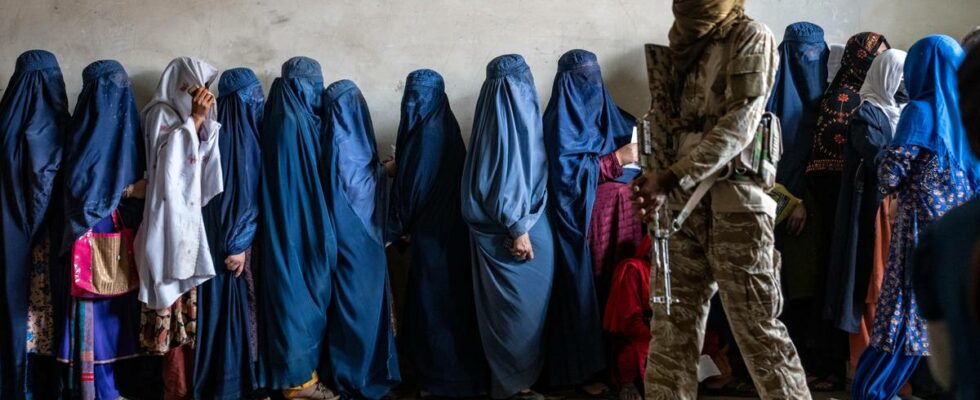When the Taliban took power in Afghanistan three years ago, they promised to let women study, work and be active in society – within certain limits. The last week left no doubt that this was just a lie. On Tuesday, the Ministry of Morals, which has had the dust brushed off from the last time the Taliban were in power in Afghanistan, presented a series of Sharia laws. – Every time you think they have taken everything that can be taken away from girls and women, they find something new to take, says Heather Barr from Human Rights Watch (HRW). In 2021, when the Taliban overthrew the Afghan government, they moved the Ministry of Morals into where the Ministry of Women used to sit. Here they are replacing the sign outside the building. Photo: JAVED TANVEER / AFP Prohibition with women’s song The news agency AP has gained access to the 114-page document. It contains laws to “promote virtue and prevent vice” on 35 different points, the agency writes. One of the points concerns women. Among other things, it should state that: Women must cover their faces in public to avoid being tempted or tempting others. A woman’s voice is seen as intimate, and should therefore not be sung, recited or read aloud in public. Women cannot look at men they are not related to, and vice versa. Women must always cover their bodies in public. Clothes should not be tight, short or thin. Women must be covered when they are with men outside their family Women must be covered in front of all non-Muslims, so as not to be corrupted. Another article prohibits the publication of images of living beings, something that further stifles the already pressing freedom of the press in the country. Another prohibits the transport of female tourists traveling alone, writes AP. Institutionalizes women’s oppression Several of these rules have already been introduced as mandates. The first came just days after the Taliban took the capital, Kabul, on 15 August 2021. The Taliban’s oppression of women happens daily, in the form of denying them education beyond the sixth grade, health care, work, walking alone in the streets or getting help for to escape violence and abuse. Several human rights organizations have documented this in the last three years. But this is the first time they are using the conventional process for legislation, which the regime they overthrew in 2021 used. Barr from HRW thinks they have spent some time testing how far they can go. She heads the HRW group that monitors women’s rights. – When they now give legal status to these rules, they institutionalize themselves. At the same time, it is a test of how the international community responds to this, she says. The Taliban have gradually institutionalized their rule. And gradually reintroduced old sharia laws. Photo: Siddiqullah Alizai / AP But she is not surprised that it was this way. – There were no Afghan women who believed the Taliban’s promises in 2021. There were only a few international diplomats who at least pretended to believe them, because it made it easier for them to withdraw from the country, she says. – World society gives in. The time at which this happens is important, says Barr from HRW. On Tuesday this week, it became clear that the Taliban are denying the UN’s special rapporteur for human rights in Afghanistan entry into the country, because they believe he has spread propaganda. A spokesperson for the government told the Taliban-controlled broadcaster Tolo. The rapporteur has criticized the Taliban’s treatment of women and girls, and said that it could be a violation of international law. Richard Bennett is the UN’s special rapporteur for human rights in Afghanistan. He is now denied entry into the country. Photo: Ali Khara / Reuters Three weeks ago, all female representatives were also excluded from Doha 3, an annual meeting between the Taliban and more than 25 UN countries. – The Taliban made demands on the international community, and the international community gave in to them. Women were not allowed access to the main meeting, and women’s rights were not on the agenda at all, says Barr. She emphasizes that Afghanistan has one of the world’s most serious women’s rights crises in the world. – Now the Taliban see that they can do exactly as they want, she says. Gender apartheid The Taliban’s treatment of women is gender apartheid, i.e. systematic oppression on the basis of gender, according to the UN and a number of Afghan women’s rights advocates. The woman must be covered in public, in front of men outside the family and in front of all non-Muslims, according to new current laws in Afghanistan. Photo: WAKIL KOHSAR / AFP But gender apartheid is not mentioned in international law. Afghan and Iranian lawyers and legal advocates are pushing for change. – It is difficult to imagine how bad it can be for Afghan women. But it depends on how the international community reacts. If it listens to the women’s wish for gender apartheid to be included in international law, and present the case to the ICJ or ICC, it will help, says Barr. Published 25/08/2024, at 18.29
ttn-69
The Taliban ban women’s votes in public and fire security guards without beards – news Urix – Foreign news and documentaries

